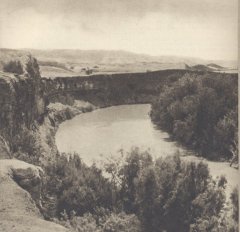This Article: (9 Pages)
- 1. John in the gospels
- 2. John's links to the Judean ruling... elite
- 3. The standard of learning in the... years C.E.
- 4. The beauty of John's letters
- 5. John, son of David and Aaron
- 6. John's letters
- 7. John's great issue – his... letters & The Great Lie
- 8. John himself
- 9. John's summary: The word made flesh
2) John's links to the Judean ruling elite

We are given an aside that shows John has links to the High Priest that we would not expect. John has the entry into the house of no less than Annas, and is known by Annas.
And Simon Peter followed Jesus, and so did another disciple: that disciple was known unto the high priest, and went in with Jesus into the palace of the high priest. But Peter stood at the door without. Then went out that other disciple, which was known unto the high priest, and spake unto her that kept the door, and brought in Peter. (John 18:15-16)
After this event they then proceed to Caiphas' place of judgement where again it seems John is part of the furniture, yet however, Peter is questioned and leaves in fear. John does not fear and does not leave, John knows these people of the Judean leadership and is known by them.
John has a powerful connection. Annas was the father to High Priests. He was father in law to Caiphas and no less than 5 of his descendants subsequently occupied the role of high priest. How does a simple Galilean fisherman come to be so well connected he can just walk in?

It may be surmised that even though Annas and company know him and know John is 'unlearned', that he is not a scribe, he has been known to them and has sat in on conversation in Jerusalem. John witnesses John the Baptist speaking to the priests, and if you read carefully you can see John is with the Jews, which is what John calls the Judean leadership, when they go out to hear John the Baptist
And this is the record of John, when the Jews sent priests and Levites from Jerusalem to ask him, “Who art thou?” (John 1:19)
It is John only who mentions all the discussions held by the Judean leadership. John may have been an eyewitness,
Then many of the Jews which came to Mary (sister of Lazarus), and had seen the things which Jesus did, believed on him. But some of them went their ways to the Pharisees, and told them what things Jesus had done.
Then gathered the chief priests and the Pharisees a council, and said, “What do we? for this man does many miracles. If we let him thus alone, all men will believe on him: and the Romans shall come and take away both our place and nation.”
And one of them, named Caiaphas, being the high priest that same year, said unto them, “Ye know nothing at all, Nor consider that it is expedient for us, that one man should die for the people, and that the whole nation perish not. And this spake he not of himself: but being high priest that year, he prophesied that Jesus should die for that nation;
And not for that nation only, but that also he should gather together in one the children of God that were scattered abroad. Then from that day forth they took counsel together for to put him to death.
Jesus therefore walked no more openly among the Jews; but went thence unto a country near to the wilderness, into a city called Ephraim, and there continued with his disciples. (John 11:45-54)
John has a high regard for the prophecy of the High Priest, and it seems by the aside John adds that after the event John understands the prophecy. It is clear that Jesus knew what was determined at that meeting, and it makes sense if John had been there (just as he later sat in on the trial of Jesus), and had told Jesus. John alone mentions Nicodemus a ruler of the Jews, whereas none of the other gospel accounts do. Nicodemus was a Pharisee and a learned Master teacher, or doctor of the Law (John 3:10). John knows him well enough to gather and write the account his witness.
There are many misconceptions of what Anti-Christ means due to mis-information, and sensationalism. It is not hard to confirm what the Bible actually says.

 Show All
Show All

